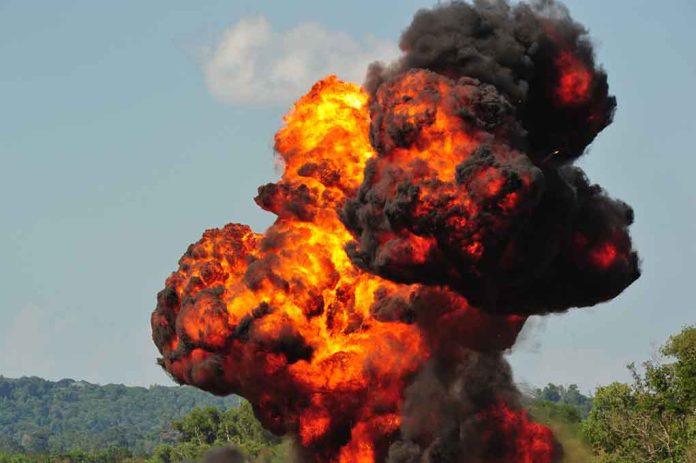
A deadly fuel tanker explosion in Haiti claims 24 lives, leaving dozens severely burned and a nation in turmoil.
At a Glance
- Fuel tanker explosion near Miragoane, Haiti, kills 24 and injures 40
- Victims suffered severe burns, some with 80% of their bodies affected
- Explosion occurred as people gathered spilled fuel after a collision
- Incident compounds Haiti’s ongoing political and humanitarian crises
Tragic Explosion Highlights Haiti’s Desperate Situation
In a horrific incident that underscores Haiti’s ongoing struggles, a fuel tanker explosion near Miragoane has claimed 24 lives and left dozens critically injured. The tragedy occurred when desperate citizens rushed to collect spilled fuel from a tanker that had collided with another vehicle. As people gathered around the leaking tanker, it suddenly exploded, engulfing victims in flames and causing catastrophic injuries.
The explosion took place approximately 60 miles west of Port-au-Prince, Haiti’s capital. Emergency services were quickly overwhelmed, with local hospitals struggling to cope with the influx of severely burned victims. Many suffered burns to over 80% of their bodies, highlighting the devastating nature of the blast.
24 killed in Haiti fuel tanker explosion https://t.co/r3YM6o7Ll9
— BBC News (World) (@BBCWorld) September 15, 2024
Government Response and Ongoing Challenges
Haiti’s interim Prime Minister, Garry Conille, rushed to the scene, witnessing firsthand the horrific aftermath. Conille’s presence underscores the gravity of the situation, but also highlights the government’s limited capacity to respond effectively to such crises. Haiti’s troubles are numerous. The nation continues to grapple with widespread gang violence, political instability, and a humanitarian crisis that has left millions hungry and displaced.
“It’s a horrible scene we’ve just witnessed,” Mr. Conille said at Port-au-Prince airport’s tarmac, where some of the injured were arriving.
This latest tragedy comes on the heels of a similar incident in 2021, where over 60 people lost their lives in another fuel tanker explosion. The recurrence of such events points to a systemic problem of fuel scarcity and desperation among Haiti’s population. With gang-controlled highways disrupting fuel deliveries, citizens are often forced to take extreme risks to secure essential resources.
International Aid and Long-Term Solutions
The explosion has once again drawn international attention to Haiti’s plight. Earlier this month, U.S. Secretary of State Anthony Blinken visited the country, pledging $45 million in aid. However, throwing money at the problem without addressing the root causes of Haiti’s instability is unlikely to provide lasting solutions.
The fuel tanker explosion is a stark reminder of the urgent need for comprehensive reform and support in Haiti. Without addressing the underlying issues of gang violence, political instability, and economic despair, such tragedies are likely to continue. The international community must work alongside Haitian authorities to implement long-term solutions that go beyond mere financial aid, focusing on rebuilding infrastructure, strengthening governance, and creating economic opportunities for Haiti’s citizens.

















